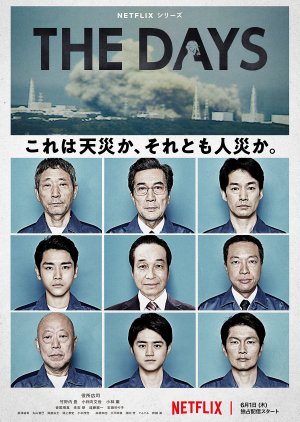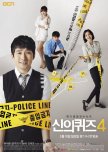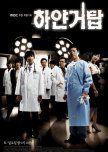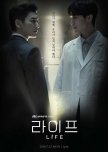
A story about human people
Everything contributed to make this drama a must watch for me. Not an easy one, I was prepared for that, but definitely a worthy one. The rating reflects it.Well, when I say everything, I mean the cast and the topic.
The cast :
I came here for Kohinata, and I was first disappointed to see him play a politician, once again if I may say so. But who can say he is not good in this kind of serious, introspective, sometimes bursting with anger and helpless at so many other moments, mean and somehow inhumane roles ?
I was also very curious to see more of Yakusho Koji, recently awarded in Cannes Film Festival for his role in another movie. If it’s not my first drama with him, it’s the first time I’m watching one where he has such a prominent role. As expected maybe, I was not disappointed by his performance. He carries the whole story, and I’m under the feeling he gave justice to the man he has incarnated on the screen. The calm and comforting force emanating from his character, Yoshida, somehow helped me continue watching the show, as the man might have helped all his co-workers in this unheard situation.
If I’m not the kind raving about Takenouchi Yutaka, as I’ve never fallen under his charm, I have to admit his performance is perfectly fitting the character.
Overall, the entire cast did a pretty good job portraying those characters, giving life to people who were only disembodied shadows seen from the other side of the world. Most of all, their interpretation is giving homage to the hard work those people have done in such a critical time, a work we had no idea about at the time while watching those air images of the nuclear plant at the time.
The topic :
Indeed, the topic itself interested me, I can’t say personally because I have no relation with the people in the area, yet in a very inner way. Allow me an almost off-topic digression about this event.
I remember very well this day on March 11th, in 2011. I had started watching Asian (and when I say Asian, I mean solely Japanese) dramas for several months at the time, and it has overtaken my life to the point that it was the only thing I was watching at the time. At the beginning of 2011, I was starting to dream about visiting Japan, though I felt like I would never dare to do so. But I have already said my co-workers that I was interested in Japan. That day my boss came at the office at around 9AM and said to me, almost casually because at the time we had no idea how strong the disaster was, that a big earthquake had occurred in Japan. I had the possibility to go back at home during lunch time, I watched the news and discovered the big damages due to the earthquake and the tsunami : at that time it was the tsunami that stroke me the most, mainly because it was what was mostly filmed by people in the area. I still have strong remembrance of certain images. The next days, I followed the news, and mostly the ones coming from the nuclear plant in Fukushima. It had become the primary source of worries for the whole world. I remember all the speculations about the consequences on the Japanese territory and the whole world of this nuclear disaster. I remember also, that we never really knew what was happening in the plant at the time, the comments were on par, more or less, with what is shown in the movie. I remember vividly also, my colleagues and family telling me that going to Japan was not a good idea anymore. That was it, for months…
Back to the drama. I was eager - that might sound a gloomy, unhealthy idea, but I was eager to see what happened inside the plant at the time. I was expecting difficult times, difficult events, and the story, while unfolding, fully shows them. But with a gravity, and at the same time, without any over-dramatic effect, that gives them the solemnity required for such a tragic event. The performance of the cast, as said above, plays a big part in that. But the cinematography does a good job, conveying through the lightning and some effects, the feelings and experience those people must have had at the time. The music is beautiful, yet I can’t really describe it. Because it’s here, everywhere, underlining the tragedy, yet never overshadowing the reality of the images.
I guess there were a lot of CGI for recreating the nuclear plant, but at least things felt real.
While the situation may have felt suffocating for the people working in the area, confined in their protective suits and in small areas (control room, disaster center) - and we are somehow understanding this feeling while watching the drama - we are nevertheless lead by a more comfortable feeling : the solidarity between the teams on the site (not talking about remote centers in Tokyo), which is truly beautiful to watch.
And that is the strong point of that drama : despite its theme, despite all the tragedy we are witnessing and guessing, because we know they are condemned sooner or later, this is a beautiful story. It pays homage to the courage, mental strength, commitment, and sacrifice of the people who were there, by chance, unfortunately we may say, and that stayed and gave their best. Entangled in a disaster they did not have seen coming, that was unprecedented in some of its aspects, they managed to try again and again, endlessly it seems, against all the obstacles that came ahead, one after the other. They might have wanted to leave, they might have wanted to give up, but they gave their utmost to overcome the situation. Those people were ordinary people confronted to the extraordinary. Being able to respond to it, is something that has always felt amazing to me. I bow to people who are able to do so.
It was an important drama to me. Not an easy watch, I said it, and I sometimes came reluctantly because I knew it would be overwhelming. It was, I shed some tears (which I generally don’t in realistic dramas), especially at the end of episode 7, that I found heartbreaking. I won’t describe those scenes, but they somehow describe so well, without any proper explicit word, all the feelings people might have felt in such a time. I’m also keeping with me the beautiful gravity of all the feelings that passed though that red phone line between the disaster center and the control room : the silences between Yoshida and Maejima said more than any word. It was, truly, a story about human people.
Was this review helpful to you?

"What is the meaning of those days?"
The Days focused on the immediate aftermath of the March 11, 2011 earthquake and tsunami and their catastrophic effects on the Fukushima Daiichi Nuclear Power Station. The events were shown from the side of the workers and their heroic efforts and the political side which was hindered by personal stakes, ineptness, and evasion of responsibility. The performances were engaging and nuanced and by far the strength of this drama based on the tragic real-world calamity."Mistake or destiny?"
When the earthquake and tsunami devastated the electrical grid, the power plant was left without electricity relying on back-up generators to keep the safety measures going. Never dreaming that a tsunami would reach the heights it did, the generators were ruined by seawater. Men in the control room were in the dark both literally and in relation to what was going on in the deadly monsters they were in charge of. Maejima was assisted by veterans Furuya and Osugi as well as younger operators who sought to do what they could only aided by flashlights.
"Forlorn hope"
Manager Yoshida Masao set up headquarters in the Seismic Safe Room to assess the damage and brainstorm responses to the critical issues. Hampered by a loss of almost all communication after the tsunami and largely cut off from the rest of the world the plant operators had to use what they had to try and determine the status of the four units. They resorted to using car batteries to attempt to open vital valves. Things went from bad to worse with aftershocks and hydrogen explosions. Yoshida sought to protect his workers as best he could even while knowing they risked their lives as they attempted to gain information by traveling into the belly of the radioactive beasts and for the workers who fought to remove radioactive debris to bring the fire trucks and the hoses needed to supply water to cool and de-pressure the escalating situations. Eventually, he made the hard decision of who would stay as he ordered the evacuation of most of the workers, knowing that those who remained might die if the worst happened.
"Our company has lost its mind."
On the political side of things, Prime Minister Yan was not advised by nuclear power experts but often those who seemed to be political appointees-who needs an economist during a nuclear disaster? The management at TEPCO was completely unprepared for such a disaster and the manuals gave no guidelines. Both the political and business advisors seemed to be more concerned about giving unpleasant news or being held accountable. They also worried about looking bad to the public and never mentioned the nuclear meltdowns by name. Their ineffectual echo chamber could have led to even more devastation if Yoshida had listened to them. Yan at one point belittled the heroes' efforts. While the people safe from harm worried about plausible deniability, they failed to supply the plucky workers with the basic supplies they needed.
"We don't have a guide, we're in it to the end."
Yakusho Koji gave a powerful performance as Yoshida. Without histrionics he conveyed the calmness and strength of the man in charge of saving the nation with his decisions. Yakusho expressed grief, horror, resoluteness, and exasperation with his face and body movements and provided a stalwart character for the others to trust in and lean on. He showed Yoshida's defiance with deftness and even humor. It has been a long time since I have been so engaged by an actor's performance. Takenouchi Yutaka, Kobayashi Kaoru, and Musaka Naomasa played the operator warriors in the dark control room who braved the dangers so close to the deadly radiation. Though their faces were often covered by protective equipment and respirators the veteran actors' performance came through. These men portrayed, like Yoshida, knew their chances of surviving were slim to none and yet they did whatever was necessary for the greater good.
"I can no longer leave here alive."
The drama displayed the events and actions almost hour by gripping hour. I was always shocked by how much the operators had accomplished when the time clock was shown. Yoshida came across as the hero of this story and the faithful men who risked their lives to cool down and calm the radioactive beast that had the power to leave a third of Japan uninhabitable for decades. The actors who played the fearless Daiichi workers gave understated and formidable performances that were compelling and emotional. The Days was a cautionary tale of human hubris in the face of nature and yet how there are still heroes among us. It is a drama well worth the time for viewing.
9/7/23
Was this review helpful to you?

A Story of Perseverance Despite Setbacks
The Days is an 8 Episode drama series based on true events on the Fukushima Daiichi Nuclear Power Plant Disaster in March 2011. If you’re interested in disaster dramas, then this drama is for you.The drama follows Yoshida, the station manager, during his struggle with trying to keep the station stable. He has to balance out the lives of his colleagues and subordinates, and also his commands from senior TOEPCO management and the Japanese government. He has many ethical dilemmas that we as a viewer, feel the struggles of making these difficult decisions. The time following Yoshida, is also interspersed with time following various teams working on the effort to restore the station to safety.
It has many incredibly tense and emotional moments - that really put yourself in the situation. Especially if you watch the episodes back to back, it makes you feel the stress the teams must have felt during the days after the tsunami.
By the end of the last episode, the drama places most of the blame between the Japanese government and TOEPCO - which after researching the incident in more detail, I would very much agree.
There were some points where there is some technical jargon which is not necessarily explained, so you may feel slightly confused, but often the jargon that isn’t explained isn’t necessary for the story. However, one thing that can be slightly confusing is when they discuss the pressures for the various units, and as we move from one unit to another it can be confusing onto what the status of the various units and which one is in danger for example.
If you like apocalyptic or disaster dramas, then do watch this show! I was gripped each episode, and wanted to know how things evolve. And even if you know the ending with the real life situation, it is still incredibly gripping and is a must watch.
Was this review helpful to you?

Well if you like real life disaster drama - this is for you.
Well, The Days brings the one of the most disastrous nuclear incident in the world - Fukushima Daiichi Nuclear Disaster into our screens. I am quite interested on one of the most disastrous incidents in human history so I watched it.When compared to Fukushima 50 (that one is rather short to describe in detail as it is a movie), The Days simply has more and longer time to tell the story, the information of the incident in depth, and the possible horror that can be result in the future.
Imagine that the possible worst scenario - 50 million people will lose their homes, the need of countless companies will need to relocate elsewhere in the worst scenario can cause chaos and logistics nightmare in the country that will continue in many years to come...
It was lucky that everything is in control and we need to thanks the team for made the situation under control with the great teamwork and their restlessness to try to control the situation. There are a lot of fears, sadness, anger and a few light-hearted moment in the story.
I hope that there won't be a third Chernobyl or Fukushima - these incidents are extremely disastrous.
Was this review helpful to you?

La pression monte dans cet hybride anxiogène
The Days relate les événements du 11 mars 2011 avec une narration lente (parfois ennuyeuse), mais dégageant une force brute percutante.Si vous cherchez un scénario catastrophe avec des personnages aux caractères trempés et développés, The Days n'est pas pour vous. On s'éloigne complètement des productions comme Pandora (2016) ou Chernobyl (2019).
En réalité, The Days s'approche plus du drama/documentaire retraçant les faits de l'accident nucléaire de Fukushima Daiichi en se basant sur le livre/témoignage de Masao Yoshida, le directeur de la centrale au moment de l'accident. Un témoignage précieux qui nous ait relaté avec SES mots. Et monsieur Masao avait un parlé subtile et profond.
La BO et l'atmosphère sont immersifs. La tension crépite sans cesse dans l'attente d'une nouvelle secousse, d'un nouveau tsunami ou pire, une explosion des réacteurs. Il fait remonter des souvenirs. Je me revois devant la télé à suivre l'avancement de la situation, le cœur battant en me demandant comment il était possible de faire face à une telle catastrophe qu'on espérait ne plus revivre. Bien que je n'ai pas connu celle de Tchernobyl, les séquelles sont encore palpables aujourd'hui.
Les acteurs sont tous bons. Je ne vais pas m'y attarder, mais chacun représente un ensemble de personnes qui étaient là. Ces personnes qui ont lutté de toutes leurs forces pour empêcher le pire. Des hommes et des femmes qui ont sacrifiés leur vie pour préserver celles des autres.
Côté narration, sa lenteur est volontaire et permet d'apporter une force terrible. Or, ce n'est pas entièrement maîtrisée, car de temps à autre, c'est un chouïa trop long. Sans donner l'impression de voir un documentaire, le drama arrive à nous informer de chaque minute après que le tsunami ait frappé la centrale. En revanche, la narration est parfois ponctuée de certaines interventions de Masao Yoshida qui apporte que plus de concret et de réalité. Et c'est le point le plus important. C'est réel !
Quoiqu'il en soit, si vous attendez de The Days un scénario catastrophe ce n'est pas le cas. En revanche, si vous êtes curieux.euses de découvrir les faits, n'hésitez pas.
Une tension poignante pour une réalité terrifiante.
Was this review helpful to you?
Parce que nous dansons tous sur un volcan...
J’avais vu un documentaire très intéressant sur ce même thème et j’ai retrouvé dans le drama certains évènements décrits, les histoires de vannes à ouvrir (ou fermer ! ) à la main entre autres. Car la volonté est nettement de coller au mieux à l’aspect documentaire, tout en utilisant la réalisation comme outil pour dramatiser l’histoire. L’impuissance des hommes face à une situation totalement imprévue et terrifiante est aveuglante ainsi que l’incapacité totale des « experts » à apporter une quelconque réponse concrète aux questions du premier ministre… La façon dont chacun se défile devant la responsabilité serait presque comique si elle n’était pas si tragique !La phrase du Directeur « demander à des ingénieurs du nucléaire de réparer une pompe… » montre clairement que toutes les technologies sont battues par l’eau, les décombres qui barrent les routes, et on en arrive au moment où de nouveau seules l’imagination, la créativité du cerveau humain va tenter d’inventer des moyens de surmonter les obstacles. Chaque idée de solution se heurte à une nouvelle impossibilité, la radioactivité monte, le risque de fusion augmente… Le directeur doit agir, et la hiérarchie est un frein puissant car chacun refile la patate chaude de la responsabilité au voisin… Les politiques à TOEPCO, celle-ci aux équipes sur le terrain…
J’ai été captivée par ce drama surtout par le réalisme et parce que c’est « basé sur des faits réels » , ce qu’on a constamment à l’esprit ! L’interprétation est parfaite avec en tête YAKUSHO Kôji, suivi d’une troupe de vieux routiers des écrans japonais, avec tous des filmographies longues comme le bras ! On sent l’expérience, et aussi la volonté de s’investir, d’y mettre tout son cœur !
Je reconnais qu’il y a une certaine lenteur dans la réalisation, avec des pauses sur des plans fixes qui insistent sur la pesante angoisse qui n’a pas lâché tous ces hommes pendant ces quelques jours terribles, et sur les choix impossibles à faire : qui reste ? ! Mais il n'y a pas une minute de dramatisation inutile, de pathos, pas de trémolos dans le discours habituel à ces situations : "ce fut un honneur..." , on colle à la réalité, et au fait qu'il n'y a pas de héros, mais des hommes qui doivent vaincre leurs peurs...J’ai beaucoup aimé ce drama, comment ne pas être passionnée par l’évolution d’une situation qui pouvait détruire un pays, et changer l’équilibre du monde ? Il est facile ensuite de jurer ses grands dieux « plus de nucléaires ! » mais alors renoncerons-nous si facilement à toute l’énergie nécessaire à notre simple vie quotidienne ?
Bref, regardez ce drama pour voir une très bonne série et pour ne pas oublier que, comme le Japon, nous dansons sur un volcan !
Was this review helpful to you?







































